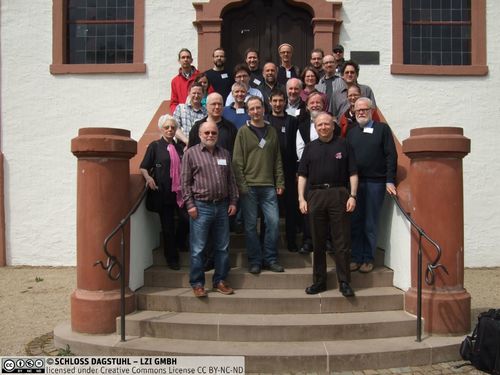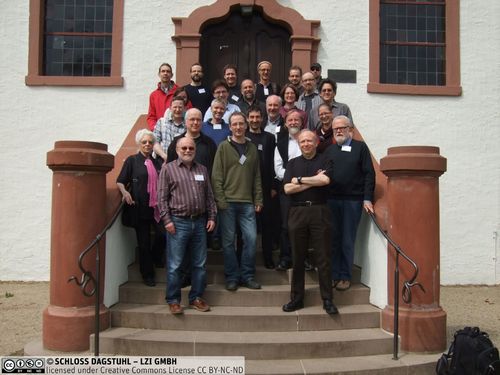Dagstuhl Perspectives Workshop 14182
Categorical Methods at the Crossroads
( Apr 27 – May 02, 2014 )
Permalink
Organizers
- Samson Abramsky (University of Oxford, GB)
- John C. Baez (University of California - Riverside, US)
- Fabio Gadducci (University of Pisa, IT)
- Viktor Winschel (Universität Mannheim, DE)
Contact
- Christina Schwarz (for administrative matters)
Schedule
Since the 1960s, category theory has been recognised as a powerful conceptual framework and a flexible specification language. The range of research areas where categorical methods found application is quite wide: from physics, economics, and linguistics to many branches of mathematics, especially algebraic geometry, algebraic topology, and logic. And, of course, computer science: possibly the discipline, apart from mathematics, where these methods have been most wholeheartedly adopted. Indeed, they have become part of the standard “tool-box” in many areas of theoretical informatics, from programming languages to automata, from process calculi to type theory.
Despite their flexibility and expressiveness, a more general acceptance of categorical methods has been hindered by the perceived difficulties of the formalism. As a consequence, many researchers in different communities share the feeling of under-exploitation of the potentialities of category theory to their areas of interest. The seminar proposes to bring together people from various disciplines that are interested in the application of categorical tools in their research area, moving from computer science towards venues such as economics, mathematics, and physics.
Topics for the workshop include quantum computing, mathematical physics, distributed and concurrent systems, programming languages and models, rewriting, modal and first-order logics, (co)algebraic specifications (and non-well founded sets), reflexive economics, epistemic game theory, automata theory, and visual languages. Some of these items span more than one discipline, e.g. game theory, and the list is far from exhaustive. Although the scope of the meeting is broad, the over-arching research theme is to develop categorical methods as a unified approach to the modelling of complex systems.
Despite the relevance of each research topic, and the benefits to their understanding that may come from a plurality of voices in a discussion, the seminar will indeed address more general concerns. As far as each single discipline is concerned, the workshop should help the reconciliation of the research strands that are using categorical tools. Most importantly though, the meeting should aim at building bridges between disciplines, by checking the variety of uses of categorical methods in different fields and trying to find common abstractions that allow the same structures and concepts to be recognized as they arise in very different settings, and to be transferred from one area to another.
The overall purpose of this Dagstuhl Perspectives Workshop would then be to start developing a coherent research community applying categorical methods to a wide range of disciplines. The common mathematical language and concepts can provide a basis for fruitful cross-disciplinary interactions by fostering cross-fertilisation and facilitating “technology transfer”, locating synergies and exploring new directions, thus helping to build a modern structural applied mathematics fit for the 21st century.
Since the 1960s, category theory has been recognised as a powerful conceptual framework and a flexible specification language. The range of research areas where categorical methods found application is quite wide: from physics, economics, and linguistics to many branches of mathematics, especially algebraic geometry, algebraic topology, and logic. And, of course, computer science: possibly the discipline, apart from mathematics, where these methods have been most wholeheartedly adopted. Indeed, they have become part of the standard ``tool-box'' in many areas of theoretical informatics, from programming languages to automata, from process calculi to type theory.
Despite their flexibility and expressiveness, a more general acceptance of categorical methods has been hindered by the perceived difficulties of the formalism. As a consequence, many researchers in different communities share the feeling of under-exploitation of the potentialities of category theory to their areas of interest. This Dagstuhl Perspectives Workshop seminar brought together people from various disciplines that are interested in the application of categorical tools in their research area, from computer science towards venues such as economics, mathematics, and physics.
Besides the benefits to the understanding of each topic that came from a plurality of voices in a discussion, the meeting tried to address more general concerns. As far as some disciplines are concerned, the workshop helped the reconciliation of different research strands that uses categorical tools. Most importantly though, the workshop aimed at building bridges between disciplines, by reviewing the variety of uses of categorical methods in different fields and trying to find common abstractions that allow the same structures and concepts to be recognized as they arise in different settings, and to be transferred from one area to another.
In order to put on firm grounds the foundations of a common language, each working day included two survey lectures during the morning, which presented a variety of topics where categorical methods play a major role. These were followed by three shorter talks in the early afternoon, which presented active areas and innovative application for these methods. The day was closed by a working group session: during these sessions the attendants split into several groups according to the main thematic areas that had been identified on the first day. The variety of topics dealt with in the workshop was large, and the suggested application areas included (quantum) computation, physics, biology, complex systems, economic, social and cognitive science, and linguistics. Indeed, some of the items span more than one discipline, e.g. game theory, and the list is definitively not exhaustive.
Although the scope of the workshop was broad, the over-arching research theme was to develop categorical methods as a unified approach to the modeling of complex systems, and category theory as a paradigm for mathematical modeling and applied science. To this end, the overall purpose of the workshop was to start developing a coherent research community applying categorical methods to a wide range of disciplines. Under these terms, the workshop has been indeed successful. Laying out a common mathematical language and finding analogies among apparently distant concepts from unrelated disciplines provided a basis for fruitful cross-disciplinary interactions also by facilitating a "technology transfer". Concretely, this led to the fostering of new collaborations among the participants, and the preliminary exploration of new directions and research themes.
 Samson Abramsky, John C. Baez, Fabio Gadducci, and Viktor Winschel
Samson Abramsky, John C. Baez, Fabio Gadducci, and Viktor Winschel
- Samson Abramsky (University of Oxford, GB) [dblp]
- John C. Baez (University of California - Riverside, US) [dblp]
- Robin Cockett (University of Calgary, CA) [dblp]
- Bob Coecke (University of Oxford, GB) [dblp]
- Andrea Corradini (University of Pisa, IT) [dblp]
- Andrée Ehresmann (University of Amiens, FR) [dblp]
- Fabio Gadducci (University of Pisa, IT) [dblp]
- Ulrike Golas (Konrad-Zuse-Zentrum - Berlin, DE) [dblp]
- Michael Johnson (Macquarie University - Sydney, AU) [dblp]
- Bartek Klin (University of Warsaw, PL) [dblp]
- Barbara König (Universität Duisburg-Essen, DE) [dblp]
- Tom S. Maibaum (McMaster University - Hamilton, CA) [dblp]
- Martin Meier (IHS - Wien, AT) [dblp]
- Francois Metayer (University Paris-Diderot, FR) [dblp]
- Ugo Montanari (University of Pisa, IT) [dblp]
- Jeffrey C. Morton (Universität Hamburg, DE) [dblp]
- Till Mossakowski (Universität Magdeburg, DE) [dblp]
- Fernando Orejas (UPC - Barcelona, ES) [dblp]
- Dusko Pavlovic (University of Hawaii at Manoa - Honolulu, US) [dblp]
- Andrew M. Pitts (University of Cambridge, GB) [dblp]
- Gordon Plotkin (University of Edinburgh, GB) [dblp]
- Peter Selinger (Dalhousie University - Halifax, CA) [dblp]
- Alexandra Silva (Radboud University Nijmegen, NL) [dblp]
- Alex Simpson (University of Edinburgh, GB) [dblp]
- Pawel Sobocinski (University of Southampton, GB) [dblp]
- Sam Staton (Radboud University Nijmegen, NL) [dblp]
- Jamie Vicary (University of Oxford, GB) [dblp]
- Viktor Winschel (Universität Mannheim, DE) [dblp]
- Philipp Zahn (Universität Mannheim, DE) [dblp]
Classification
- security / cryptology
- semantics / formal methods
- verification / logic
Keywords
- Quantum computing
- mathematical physics
- concurrent systems
- programming languages
- semantics
- graph rewriting
- logics
- (co)algebraic specifications
- economics
- epistemic game theory
- automata theory



 Creative Commons BY 3.0 Unported license
Creative Commons BY 3.0 Unported license
